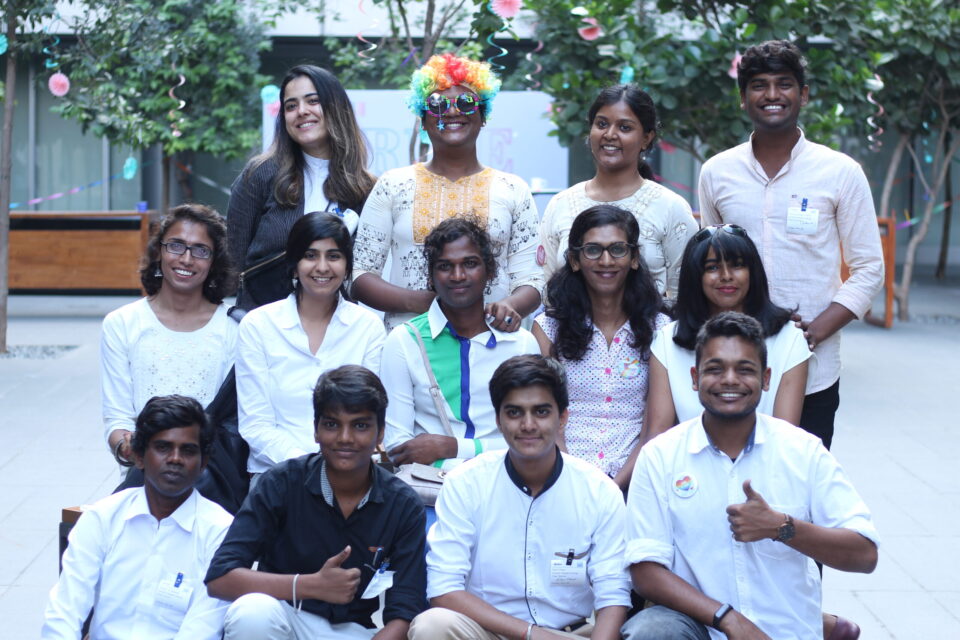Neelam Jain is pushing hard for corporate India to accept Transgenders and give them meaningful employment.
“The last census count registers 4.5 million people who identify themselves are transgenders, but the number is at least 10 times that, or even more,” says the soft-spoken Neelam Jain, co-founder at Periferry, a self-sufficient non-profit agency that works with transgenders to educate, train, and place them at corporate organizations in South India. “It’s a Catch 22 situation—if they identify themselves and come out, they will be harassed and brutalized, and if they don’t put their hand up and be counted, they will lose out on everything.”
Right after college, Neelam Jain joined Goldman Sachs as a business analyst, seemingly all set to run the corporate treadmill, when the young graduate—social and curious by nature—chanced upon the various non-work-related events and projects that the company financed or supported. “For someone who comes from a privileged family like I did, there was very minimal awareness about any social impact initiatives, and I was exposed to many such events at Goldman Sachs,” she recalls. One such event included a transgender on a panel discussion, where she recounted her journey in the corporate world. That left a lasting impression on the young Neelam, but she didn’t pay much thought to it, and continued with her work.
As luck would have it, Goldman Sachs launched a fund specifically for social impact, and various teams lined up to pitch ideas on women’s rights, children education, cancer research, and so on.
“A few friends and I were quite intrigued by the project idea and decided to participate,” she recalls, “and we frankly had no idea what it would entail.” The group zeroed in on impacting the lives of transgenders, and worked feverishly on the pitch. “We didn’t win the competition, but the insights, data, and field work we did blew my mind that we have this strong employment pool amidst us, and yet tend to look the other way,” said Neelam. She received a lot of appreciation, and was herself energized by the thought of building a business—recruiting, training, and deploying transgender talent—that would bring inclusion in the community.
Neelam decided to focus on the idea that refused to go away, and thought, “If this is not passion, what else is?” She moved back to Chennai, her hometown, and began her fieldwork and explorations.
“We started very small—it was just me and anyone else who was interested, going to a few NGOs who worked in this sector, and enquiring if we could help in the recruitment and training for some of their community members,” she recalls with a deprecating laugh.
Neelam met with many transgenders and the going was tough. “They came with a lot of mistrust and disbelief to the table, and were more open to just accept freebies than to commit to any training or impact-based solution.” She didn’t give up, and persisted in meeting with them, when one of the girls came up and asked if Neelam could help find her a job.
One of Neelam’s contacts runs Kola Pasi (hungry enough to kill) restaurants and was eager to help the transgender community progress. It was an ideal match—her first placement was successfully made, and she decided to formally launch her company: Periferry.
Periferry is now four years old, and is a full-fledged team. “We have placed 205 transgenders in various roles—from housekeeping to operations, finance, HR, and so on at clients like WalMart, Goldman Sachs, IBM, and others,” she states with genuine pride. With a focus on training, education, and language skills, Periferry is slowly and surely ensuring the talent they bring to the market is well sought after.
From sourcing training content online and testing their efficacy, Neelam and team today have a full-fledge program that is highly adaptive to the recruit’s context. “We began in Semmozhi poonga, then rented an empty cabin in my father’s office before setting up our current office,” says Neelam, “We’re a fully self-sufficient agency that doesn’t have to bank on grants and corporate social responsibility hand-outs, and are proud of it.”
The initial days included training—from a handful to a dozen people whom they recruited from their field visits and ground work. Today Periferry works with many community members who bring in increasing number of transgenders to events just to “even be aware of what is possible.”
Word-of-mouth is a hugely trusted communication medium for this closed group, and today, Periferry is considered a trusted agency for employment. “When one member of the community finds a job, they spread the word, and 20 more people call or contact us,” says Neelam, and this is only growing every day. “For us now, fulfilling demand is the bigger challenge.”
Periferry has been hugely successful in the deployment of transgender talent, and they boast of an average 85% success rate in the recruits staying on their jobs and being accepted as great talent by the corporate organization.
In parallel, Neelam and team also work with corporate managers and policy makers to ensure that there is non-discriminatory rules and transgender-friendly policies in place. “We cannot erase or change mindsets in one meeting or a few workshops—it is a slow process for people to change their trans-phobic ideas and beliefs, and this is time it happens at scale.”
The agency is scaling to set up a full-fledged training establishment to offer training all year-round, rather than the current seasonal engagements in place. “We want to target more medium and small enterprises to begin accepting transgenders in their work place, and create the comfort factor for both the recruit and the recruiter,” says Neelam.
“But beyond all this, we need to begin change from home,” she emphasizes, “Our ancient lore portrays transgenders as powerful catalysts at various points in time, and openly accepted in society. Where did we lose all that knowledge and awareness? Why should we discriminate against these people who are a very necessary part of our society? Changing our mindset should begin at home, in cinemas, in TV serials—acceptance and appreciation should be woven into every story we tell.” With numerous awards and recognitions on their office shelves, Neelam remains completely focused on her growth. “Don’t look for success on a daily basis, stay the course, push the buttons, and you will notice change inevitably. When we began, we didn’t place a person every day, but when we reviewed our goals and efforts every quarter, the line was creeping up,” she recounts. “Startups don’t balloon overnight, but grow incrementally every day. That daily grind matters.







